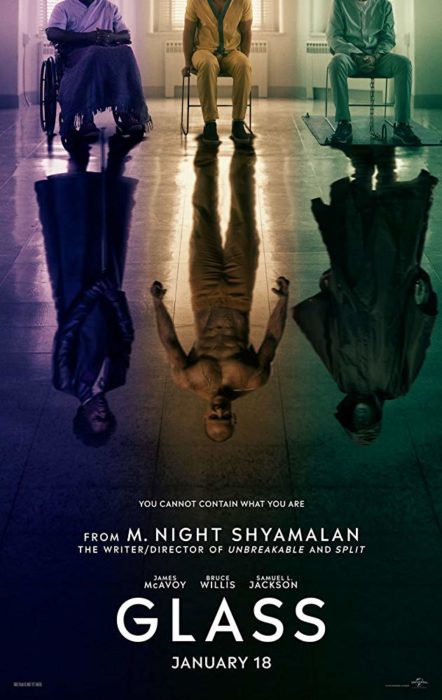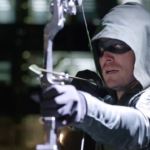A Look Through ‘Glass’
This article will take a dive into the M. Night Shyamalan film, Glass. My review will commit a few spoilers, but also will avoid giving away the twists of the last act of the story. In other words, I won’t tell you how the story ends. Or even the precursors to the end.
Note that I usually feel confident in my ability to analyze stories. I mean, my view may be controversial or unpopular and it may even be (perish the thought!) objectively wrong at times because I may miss something that clearly is in the story but I somehow overlooked it. But even though I know I can be mistaken at times, I don’t usually experience much doubt. I know what I think; I know what I like–and I (usually) am confident in my opinion.
Glass is an exception for me, not that I can’t analyze it at all but I find the basic question of was it good? a bit difficult to answer. Was it good? That really depends on what you mean.
Were James McAvoy’s personality shifts entertaining? Yes. Were the battles (there were more than one) between McAvoy’s “beast” and the mild-mannered “unbreakable” superhero (played by Bruce Willis) dramatic and worth watching? Sure, not awesome, but good. Were there powerful moments involving secondary characters? Sure. Did the ending prove to be genuinely unexpected (obviously for me)? Why, yes, it did.

James MacAvoy was fascinating to watch. Photo credit: Entertainment Insider
But there’s a quite a lot of dialogue in this movie, which isn’t of course inherently bad. A lot of pondering over the nature of superheroes and villains and specific pointed attacks on the ability of the trio of main characters to believe they actually are special. Because, as the movie previews give away, all three of them are locked up in a psychiatric ward in the middle act of the tale, where a self-proclaimed specialist in treating people with superhero delusions genuinely tries to convince each of the three that they are nothing more than mere mortals. Which was…interesting. But mostly not riveting.
This is a story driven by concepts more than characters. And it’s biggest problem (or is it a problem?) is how it does something that stems off an aspect of superhero films.
You see, an interesting quirk of the superhero film genre is “real” superheroes mostly exist in a universe in which fictional superheroes don’t exist. Oh, you have small references in certain films to the existence of the comic book world, e.g. Logan featured a scene where Wolverine dissed his own comic book as mostly fictional, or we hear references concerning Captain America that would allow him to have been in comic books back during WWII. But if superheroes were real, they’d be in high demand at comics conventions–but that doesn’t happen because the fictional universes that contain real superheroes apparently don’t contain fictional superheroes. Which is why nobody references what happened in their comic as guidance or documentation as to what they should do next or already did in “regular” superhero movies (other than that one brief reference in Logan).
In Glass, superhero comics of fictional protagonists exist in addition to the rarity of actual “super” people. But what doesn’t seem to exist in that story world is already-existing intellectual discussion of the meaning of superheroes. The characters in Glass explain aspects of being a superhero as if the audience had never thought of these things, not ever, which perhaps could be true for the story universe Glass inhabits, but it isn’t true for our universe. I don’t know if that aspect of the story was good or bad. I suppose it depends on who watches it. For many superhero fans, it may seem unnecessary or even pedantic.

A stylized view of the superhero-in-rain-poncho. Photo Credit: MovieWeb
I really liked aspects of the feel of Glass. I liked a superhero who is mild-mannered, who turns off the light before punching an abuser of random strangers, whose supersuit is a rain poncho. I liked the so-called physical villain being in fact someone tormented in the past and still struggling against his own evil via various personalities (if you were inclined to go looking for an application to the Christian life and the value of the internal struggle against evil, look no further). I liked certain moments of the dialogue and action very much. (The beast said something about Mr. Glass that really resonated with me in context: “Kneel before the ——!”)(That’s right, I didn’t give it away. 🙂 )
I also appreciated the efforts made in the story to explain away all the extraordinary aspects of the characters in the tale. It really did seem like a sort of case study on the power of skepticism to attack the reality of the extraordinary, a story aspect with a direct application to the Christian life…even if I felt the execution of the use of doubt was somewhat lacking.
What mostly doesn’t work for me is the character of Mr. Glass himself. I found him surprisingly uninteresting through most (but not all) of the story. (He, by the way, delivered quite a lot of the commentary I earlier classified as possibly unnecessary or pedantic. He and woman in the role of a psychologist.)
Each of the characters had a secondary character linked to him–for the superhero, it was his son. For Glass, his mother. For the beast, it was the captive who was released by a kinder personality of the conflicted monster. All three of these characters were interesting in relation to their main character…but they also wind up teaming up together in a way that seemed artificial to me.
Ok, I’ve done a fair amount of talking but I’m not sure how clear I’ve been. Bottom line, was this movie worth the price of a theater ticket? Or would it be better to wait to see it on a small screen?
I would say for the perhaps 10% of you would be those who adored Unbreakable and Split and just can’t wait to see how the trilogy ends, the movie is worth its price. It you’re that eager, go ahead, watch it–it delivers enough interesting stuff to be worth your time. But for maybe 90% of viewers, I think the answer to my question is “no.” It’s worth seeing mind you, but you’ll be perfectly happy having waited for it to be released to Netflix or DVD.
For those of you who’ve seen Glass, do you also feel conflicted about how you saw the movie? Would you recommend it? (If you’re going to commit spoilers in your comments, please say so in advance.)








































If I see any of the series, I think it would be on Netflix or DVD. It’s pretty rare for me to go to the theater in the first place.
The series seems interesting. It does sound like some people from the mental health community would object to aspects of it, though. A lot of times in media, mental conditions(or even just the mentally ill) aren’t depicted accurately and people hate that such misinformation is spreading. Personally, I think it’s fine to have some shows that are inaccurate, but hopefully accurate shows will be made to counter the inaccurate ones. Or viewers should just take movies as inspiration to do research on the topic in real life.
It’s been years but my recollection is the first one at least is very worth seeing and didn’t need the sequels.
I remember seeing Unbreakable years and years ago and really liking it, mainly due to the reveal at the end. But nothing on earth could move me to see the sequel Split – I hate the way mental issues are portrayed in a lot of media. And this one doesn’t motivate me whatsoever. I think I’m content to think of the first movie as a stand-alone.
The power of Split resided in an actor portraying a personality disorder that probably doesn’t exist in the real world–but movie Split actually says that. It overtly discusses how multiple personality disorder is not a real thing–except this one guy…who is in fact a sort of “super” person. The concept isn’t as offensive to mental heath realty as you might think.
That’s not quite accurate. Dissociative identity disorder is rare but it exists. I read of one woman whi had 11 different alters. On the other hand, people with DID are far more likely to harm themselves than others. So the serial killer alter is the made-up part.
RE: “an interesting quirk of the superhero film genre is “real” superheroes mostly exist in a universe in which fictional superheroes don’t exist.”
Yet this is exactly the tack I took with Johnny Came Home (https://tinyurl.com/yy9npnck). The idea was that the myths and legends of old, as well as superheroes, were based on people with extraordinary abilities.